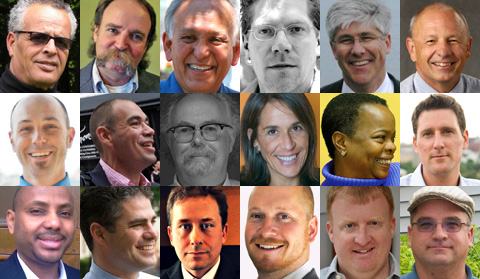
TOP ROW: Zouhair Bouzrara, Richard Dodge, Ralph Carmona, Paul Schafer, Nicholas Mavodones, Michael Brennan
MIDDLE ROW: Markos Miller, John Eder, John (Jay) York, Jodie Lapchick, Jill Duson, Jed Rathband
BOTTOM ROW: Hamza Haadoow, Ethan Strimling, Erick Bennett, David Marshall, Christopher Vail, Charles Bragdon
NOT PICTURED: Peter Bryant |
With three months until Portland's first mayoral election in more than 80 years, and two weeks until candidates are required to hand in the 300 signatures that will reserve them each a place on the ballot, a whopping 19 people have thrown their hats into the ring by taking out nominating-petition papers. It's quite a cast of characters who have entered these uncharted waters. Not only is the position brand-new, but the electoral system (ranked-choice voting) will be unfamiliar. This nebulousness invites many questions. Twenty of them, in fact. Here's hoping that at least some of these queries are answered as the campaigns take shape.
1) Why are there only two female contenders?
In a field of close to 20, only two of the mayoral candidates are female: West End marketing consultant Jodie Lapchick, and city councilor Jill Duson. At the very least, this will help set them apart in a sea of male opponents.
"While disappointed, I am not surprised at the lack of women in the race," says Katie Mae Simpson, executive director of Emerge Maine, the local affiliate of a national organization geared toward increasing the number of women in elected office. "With women representing only 16 percent of Congress, and with fewer than a third of our state legislature women, aspiring female politicians have fewer role models to look to. Research has also shown that women are much less likely to run unprompted; in other words, they need to be asked."
Or perhaps, as some have suggested only half-jokingly, Portland women are simply too smart to go after this position.
2) Who isn't running?
The Jesus guy from Monument Square. The Whistler. (Given some of the folks who appear to think they're qualified, neither of those candidacies would surprise us.) Seriously, though, there were some who were rumored to be considering a run, but as we get closer to the deadline it seems they've ruled it out: philanthropist and real-estate developer Cyrus Hagge, several city councilors, anti-domestic-violence advocate Jill Barkley, and former gubernatorial candidate Rosa Scarcelli.
3) How will ranked-choice voting affect strategy — do the candidates understand RCV?
Last November, Portlanders passed ranked-choice voting (also known as instant run-off voting); this system, which calls on voters to rank the candidates in order of preference, will be used to elect the city's mayor.
Here's a refresher on how it works: Voters rank candidates; if no candidate gets a majority (50 percent plus one vote) of first-place votes, the candidate with the fewest votes is eliminated and the second choices of those who voted for that candidate are added to the first-choice totals for all other candidates. (The city has hired a Washington DC-based firm to ensure it gets all this straight.)